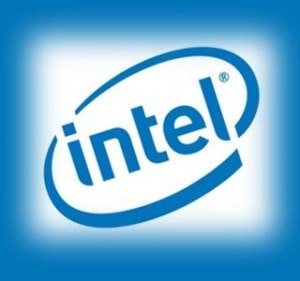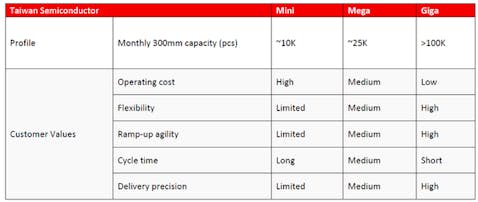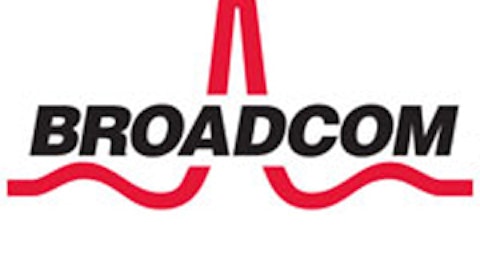
Intel doesn’t fail at creating faster processors. In fact, the company has done an excellent job of doing that, and in fact, it should continue to do that. The problem that Intel Corporation (NASDAQ:INTC) faces as every other maturing technology company is identifying growth opportunities in the space.
Some have speculated that the company will become a pure-play-fabrication (a company that focuses purely on accepting other people’s semiconductor designs and manufacturing it for them). Other more vocal optimists continue to boast about Intel’s potential in the mobile processing space.
So, in this article, I am going to explore whether or not the company can compete in pure-play-fabrication, or in the mobile space.
Pure-play-fabrication
When I think of pure-play-fabrication, I think of Taiwan Semiconductor Mfg. Co. Ltd. (NYSE:TSM). The company provides a flexible manufacturing process that allows for different levels of production output.

The company’s manufacturing is flexible as it allows companies to come to them with a small order of 10,000 wafers within a single month (represent approximately 1.7 million chips to be fair). So what gives Taiwan Semiconductor Mfg. Co. Ltd. (NYSE:TSM) a competitive advantage isn’t its ability to produce the fastest processors in terms of transistor counts (which is crucial), but because of the practicality of the solution.
The problem with Intel Corporation (NASDAQ:INTC)’s attempt to enter into the pure-play-fabrication space is that it isn’t very profitable for Intel to retrofit its fabrication facilities for a variety of different type of integrated circuits. Intel’s fabrication facilities are designed for x86 chips, whereas Taiwan Semiconductor Mfg. Co. Ltd. (NYSE:TSM) can manufacture any type of integrated circuit and even in smaller quantities (1.7 million integrated circuits), which is enough to lower the barrier of entry for companies to manufacture silicon for their own special needs.
Nowadays, there’s an integrated circuit in anything. That may include cars, air conditioning, refrigerators etc. Not every computer has to process complex commands to be a computer, and it is a fact of life that computing doesn’t have to revolve around x86. This is what gives Taiwan Semiconductor Mfg. Co. Ltd. (NYSE:TSM) a clear lead in manufacturing silicon for other companies that Intel Corporation (NASDAQ:INTC) may not have.
Mobile
QUALCOMM, Inc. (NASDAQ:QCOM) is another one of those companies that have built up a significant competitive advantage in their own respective space. What Intel doesn’t have is the near endless amount of experience QUALCOMM, Inc. (NASDAQ:QCOM)engineers have when designing mobile computing processors and 4G LTE chipsets.
There are two main-types of mass produced processors in the world. The one for mobile generally runs on the ARM design. The one for desktop and Laptop computing is x86. Intel Corporation (NASDAQ:INTC) is very proficient at designing 64 bit chips. The trouble is when Intel enters into the mobile space designing chips from the context of x86 rather than ARM. ARM chip designs are extremely compatible with Android and iOS. Meaning that if Intel really wants to compete in the space, than it has to design chips that run on the ARM architecture.

